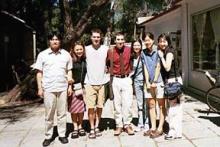The department of Asian Languages and Literature encourages its undergraduate majors and minors, graduate students, and language students to take advantage of the many study abroad opportunities available in Asia. For most students, study abroad is the ideal way to achieve advanced language competency while experiencing first-hand the cultural context in which Asian languages are used. In addition, study abroad can provide students with a valuable global perspective, enriching their undergraduate or graduate educational experience.
Most students are pleasantly surprised to discover that study abroad is affordable and need not delay graduation. Students attending UW-affiliated study abroad programs remain enrolled at UW while abroad, can make use of UW financial aid, and benefit from a streamlined process of credit transfer after their return.
Stay in contact with the Study Abroad Office here: http://www.washington.edu/studyabroad/
Study Abroad Peer Ambassadors are also available for students to contact if they would like to hear about first-hand experiences and opportunities. Contact the Ambassadors at: studyabroad@uw.edu
How to Study Abroad in Four Simple Steps
Step 1: Begin planning early!
Most programs have a summer session, a fall semester session, and an academic year session; a few programs have a spring semester session (equivalent to UW's winter and spring quarters). In most cases, deadlines for application are six to nine months before the program begins. For most programs, you should begin planning early in autumn quarter for study abroad the following summer or autumn. You may also need to consider deadlines for application for funding sources. For example, the popular Monbukagakusho scholarship for study in Japan has a deadline of early August for study beginning the following September. In short, it is never too early to start your planning! The Study Abroad website has a great online course on getting started.
Step 2: Choose a program
You will want to consider a number of factors: location, cost, instructional quality, course selection, lodging situation, cultural programs, and work and travel opportunities. There are many resources available on campus to help you select the program that best suits your interests and needs. Your language instructor is an excellent source of information. The Study Abroad office has detailed information about programs (including program descriptions, brochures, and student testimonials) and financial aid and fellowship opportunities. You can also set up appointments with advisers to get individualized advice related to the administrative and financial aspects of foreign study. The Study Abroad office is located on the fifth floor of Schmitz Hall. The Study Abroad website allows you to search their database of study abroad programs according to your specific criteria -- it's a great place to start exploring all the exciting foreign study opportunities that are available. Finally, talk to students who have been abroad. A Study Abroad adviser or your language instructor can give you the names of students who have recently returned from study in Asia.
Step 3: Begin the application process
Make sure you read the application materials carefully. Many programs require letters of recommendation or statements of language proficiency. Be sure to request these from your instructors well in advance of the deadlines. In addition, check with an advisor in the Asian Languages & Literature Department before you leave to find out what advance preparation you should make in order to smooth your credit transfer after you return.
Step 4: Apply for funding
Applications for funding should be made at the same time as, or even before, your applications to programs. If your UW financial aid is not sufficient, you can apply for other sources of funding. UW Study Abroad offers its own scholarships and has additional information on other fellowships, scholarships, and other financial resources.
Additional Information
The following cities are just some of the locations in Asia with UW-affiliated study abroad programs.
-
- China: Beijing, Nanjing, Shanghai, Harbin, Hong Kong
- India: Auroville
- Japan: Tokyo, Kobe, Osaka, Fukuoka
- Korea: Seoul
- Thailand: Khon Kaen
- Vietnam: Hanoi, Hue
You can learn more by searching via the map on Study Abroad's website.
Application Timelines and Contact Information
Contact: 206.221.4404 or studyabroad@uw.edu
Find a Program - Learn more about upcoming study abroad programs and opportunities.
Application Guidelines - Keep track of application deadlines and decide which program is the best fit for your academic goals.
Research how credits can transfer from your study abroad school back to the UW. This is a great planning tool for all students looking to go abroad or currently abroad. Be sure to check with the undergraduate advisers at HAS about courses that count towards your degree.
